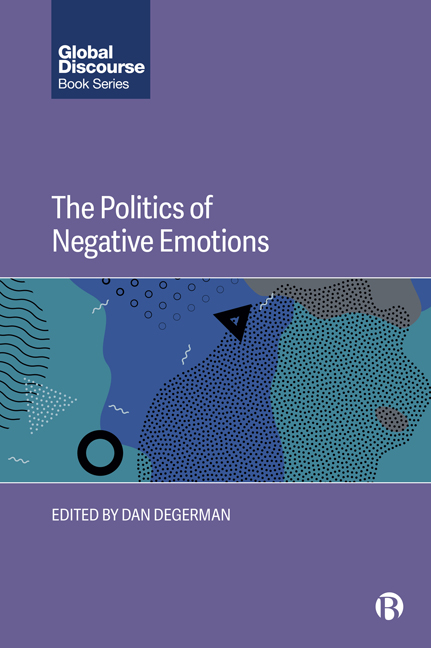Book contents
- Frontmatter
- Contents
- List of Figures
- Notes on Contributors
- Introduction: Feeling Our Way through Politics
- 1 Anger, Fast and Slow: Mediations of Justice and Violence in the Age of Populism
- 2 ‘We Will March Side by Side and Demand a Bigger Table’: Anger as Dignity Claim
- 3 Moving between Frustration and Anger
- 4 The Resentment– Ressentiment Complex: A Critique of Liberal Discourse
- 5 Green Shame: The Next Moral Revolution?
- 6 Against Comfort: Political Implications of Evading Discomfort
- 7 For Love and for Life: Emotional Dynamics at the World Congress of Families
- 8 The Functionality of Affects: Conceptualising Far-Right Populist Politics beyond Negative Emotions
- 9 Moral Economies of Exclusion: Politics of Fear through Antagonistic Anonymity
- 10 Contesting the Politics of Negative Emotions in Educational Policy Making: A Ban on Asylum Seekers’ School Visits in Finland
- Index
6 - Against Comfort: Political Implications of Evading Discomfort
Published online by Cambridge University Press: 18 January 2024
- Frontmatter
- Contents
- List of Figures
- Notes on Contributors
- Introduction: Feeling Our Way through Politics
- 1 Anger, Fast and Slow: Mediations of Justice and Violence in the Age of Populism
- 2 ‘We Will March Side by Side and Demand a Bigger Table’: Anger as Dignity Claim
- 3 Moving between Frustration and Anger
- 4 The Resentment– Ressentiment Complex: A Critique of Liberal Discourse
- 5 Green Shame: The Next Moral Revolution?
- 6 Against Comfort: Political Implications of Evading Discomfort
- 7 For Love and for Life: Emotional Dynamics at the World Congress of Families
- 8 The Functionality of Affects: Conceptualising Far-Right Populist Politics beyond Negative Emotions
- 9 Moral Economies of Exclusion: Politics of Fear through Antagonistic Anonymity
- 10 Contesting the Politics of Negative Emotions in Educational Policy Making: A Ban on Asylum Seekers’ School Visits in Finland
- Index
Summary
Introduction
Why do some situations make us more uncomfortable than others? We typically think of feelings of discomfort and comfort as highly individualised and subjective. In this chapter, however, I argue that visceral gut feelings like discomfort are not merely private emotional experiences but in a certain sense collective and public. To illustrate this point, consider the following testimony from a young African American man:
‘I feel like I’m disturbing people by just being there. Like, people feel uncomfortable when I walk in. I guess I’ve kind of become numb to it after so many years. Like, this is just my life, and it's just something that I’ve gotten used to, unfortunately.’ (Story of Access, 2018)
Imagine this young man interviewed for a job by three white men. His interviewers appear uncomfortable in his presence. Registering their discomfort, he also begins to feel nervous. If we attribute the tension in the room to individual psychology, we have told only half the story. It is well-established that we find it easier to interact with people who resemble us – for example, in terms of ethnicity, gender, and social and economic class (Danyluck and Page-Gould, 2018). The people with whom we share these characteristics increase our visceral wellbeing and make us comfortable. Emotional synchronising and empathising become easier when we share the same experiences or cultural background (Barrett, 2017; Bloom, 2018). We are drawn to people in whose company we feel comfortable and we avoid situations and people that make us uncomfortable. Feelings of discomfort usher us in certain directions, often without our explicit awareness.
The statement quoted above takes place in the context of the contemporary United States, where perceptions of race play a central role in social interaction. Evidence on implicit biases suggests that we can adapt our thought experiment to any particular social, political and geographical location, varying the example to the social identities of the setting: a woman before an all-male panel of interviewers (gender); or one wearing a hijab before a panel of European Christians or secularists (religion, ethnicity); a first-generation academic from a working class background before a panel of distinguished university professors (class) and many other parameters (appearance, weight, disability, and so on).
- Type
- Chapter
- Information
- The Politics of Negative Emotions , pp. 111 - 134Publisher: Bristol University PressPrint publication year: 2023



